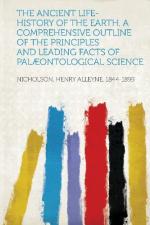These are problems which have occupied the attention of philosophers in every age of the world, and in periods long antecedent to the existence of a science of geology. The mere existence of cosmogonies in the religion of almost every nation, both ancient and modern, is a sufficient proof of the eager desire of the human mind to know something of the origin of the earth on which we tread. Every human being who has gazed on the vast panorama of the universe, though it may have been but with the eyes of a child, has felt the longing to solve, however imperfectly, “the riddle of the painful earth,” and has, consciously or unconsciously, elaborated some sort of a theory as to the why and wherefore of what he sees. Apart from the profound and perhaps inscrutable problems which lie at the bottom of human existence, men have in all ages invented theories to explain the common phenomena of the material universe; and most of these theories, however varied in their details, turn out on examination to have a common root, and to be based on the same elements. Modern geology has its own theories on the same subject, and it will be well to glance for a moment at the principles underlying the old and the new views.
It has been maintained, as a metaphysical hypothesis, that there exists in the mind of man an inherent principle, in virtue of which he believes and expects that what has been, will be; and that the course of nature will be a continuous and uninterrupted one. So far, however, from any such belief existing as a necessary consequence of the constitution of the human mind, the real fact seems to be that the contrary belief has been almost universally prevalent. In all old religions, and in the philosophical systems of almost all ancient nations, the order of the universe has been regarded as distinctly unstable, mutable, and temporary. A beginning and an end have always been assumed, and the course of terrestrial events between these two indefinite points has been regarded as liable to constant interruption by revolutions and catastrophes of different kinds, in many cases emanating from supernatural sources. Few of the more ancient theological creeds, and still fewer of the ancient philosophies, attained body and shape without containing, in some form or another, the belief in the existence of periodical convulsions, and of alternating cycles of destruction and repair.
That geology, in its early infancy, should have become imbued with the spirit of this belief, is no more than might have been expected; and hence arose the at one time powerful and generally-accepted doctrine of “Catastrophism.” That the succession of phenomena upon the globe, whereby the earth’s crust had assumed the configuration and composition which we find it to possess, had been a discontinuous and broken succession, was the almost inevitable conclusion of the older geologists. Everywhere in their study of the rocks they met with apparently impassable




